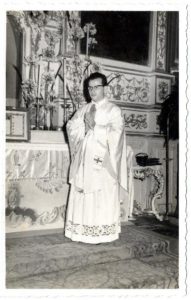Scripture Readings 2nd July 2017, 13th Sunday in Ordinary Time, Year A
2 Kings 4: 8-11, 14-16; Psalm 88(89): 2-3. 16-19; Romans 6: 3-4, 8-11; Matthew 10: 37-42
Today we hear only the beginning of this story from the Second Book of the Kings about the prophet Elisha and the Shunammite woman. She recognises this frequent passer-by as a holy man and hospitably offers him a place to stay each time he passes. Elisha promises she will have a child. Some years later the child became ill and died, and the woman urgently travels the twenty miles to Carmel, confident that Elisha will heal her son, and Elisha brings her son back to life.
Paul’s meditation on redemption leads him to ask “Shall we persist in sin that grace may abound?” No, he says, God’s grace is not evoked by sin but is the expression of God’s love. This leads to today’s profound reading: “we were buried with Christ through baptism into death” so that we “might live in newness of life”. We must think of ourselves “as being dead to sin and living for God in Christ Jesus”. After our ritual death in baptism we must unite ourselves with Christ and we will eventually share in his bodily resurrection.
In Matthew’s gospel Jesus concludes his teachings on the requirements and rewards of discipleship. Disciples must accept the trials that it entails, burying ourselves completely in Christ. But acts of charity and hospitality will be rewarded, just as the Shunammite woman found.
Psalm Response: I will sing for ever of your love, O Lord.
2 Kings 4: 8-11, 14-16; Psalm 88(89): 2-3. 16-19; Romans 6: 3-4, 8-11; Matthew 10: 37-42
